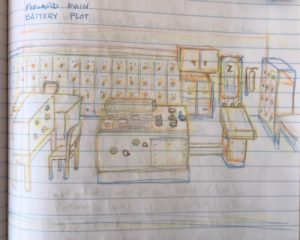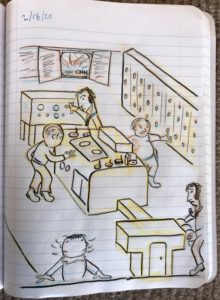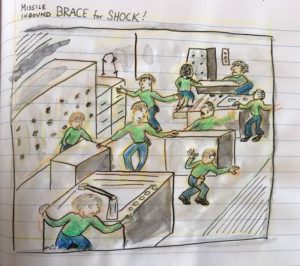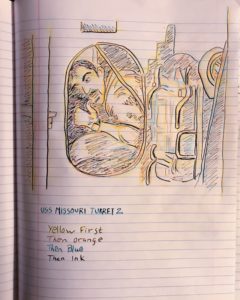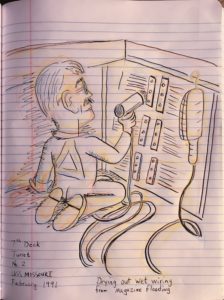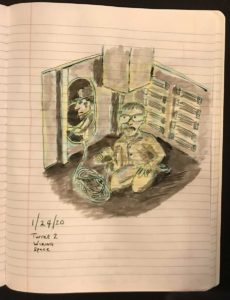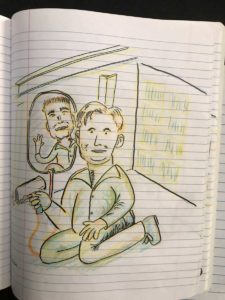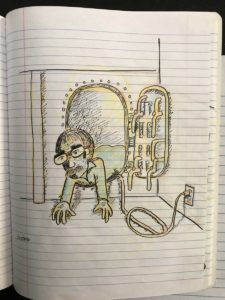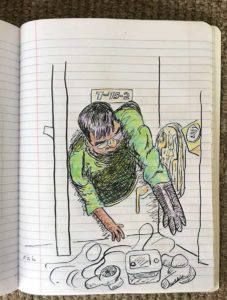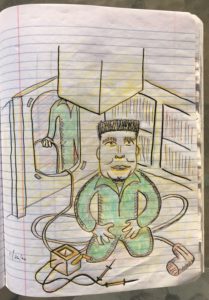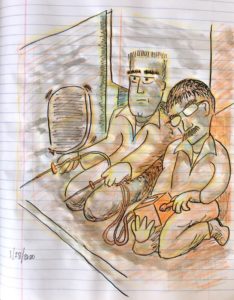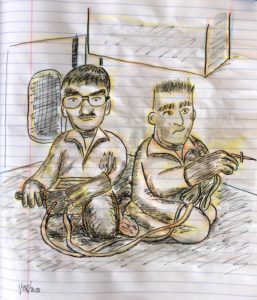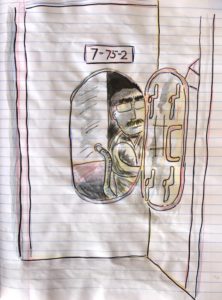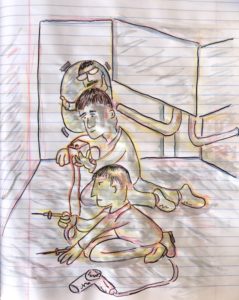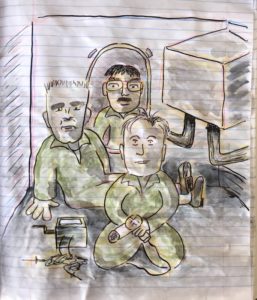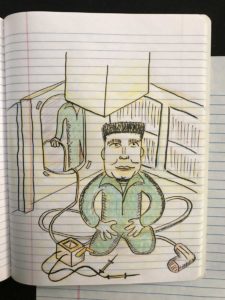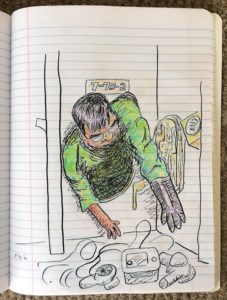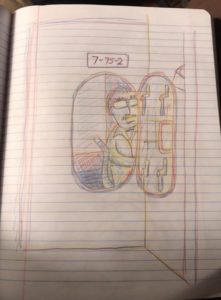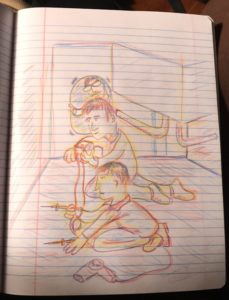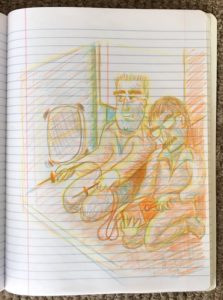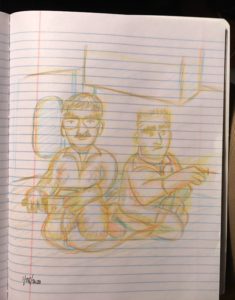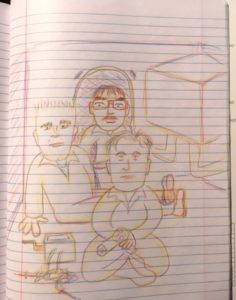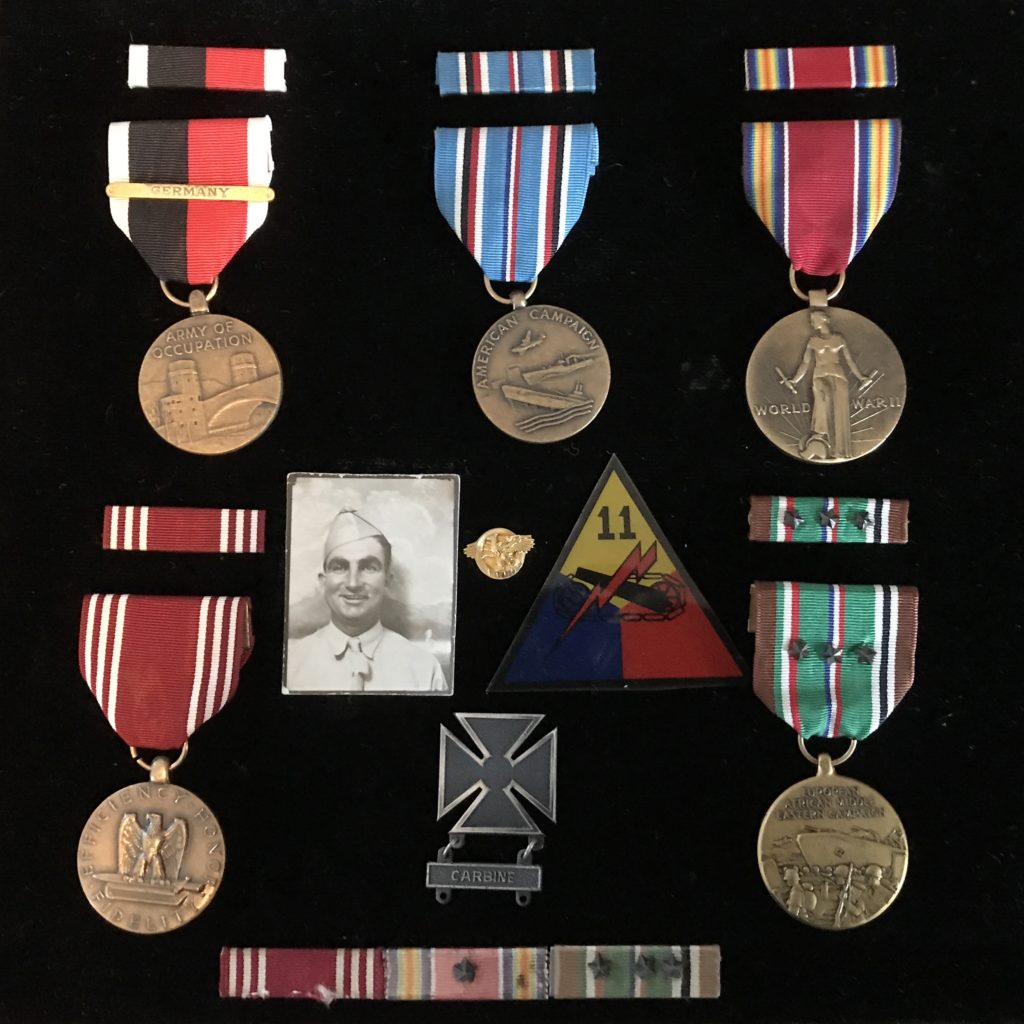These are drawn from memory of the main battery plotting room on the battleship Missouri.
Category Archives: desert storm
Done! A Series of Twelve
A couple of weeks ago, Lynda Barry posted about doing a series of twelve images of the same scene. I set out to do just that, not knowing how long it would actually take me or what the result would look like. This week, I finally finished this difficult but gratifying challenge.
The scene was after the ground war had begun in February 1991. The Iraqis had already bugged out of Kuwait, and though we didn’t realize it at the time, the Battleship Missouri had already completed her final fire mission for all time. Something happened, and I never heard exactly what, but the magazine sprinkler system was activated in Turret 2 and everything got doused with salt water. The wiring that came from our computer system in the plotting room to control the guns also got wet, which might not have been a huge deal if not for the fact that this was WWII technology and plastic was not widely in use yet. All of the insulation on the wires were made of a fabric material that soaked the salt water right up. The salt water, being an excellent conductor, shorted everything out. We had to go down to the 7th deck, all the way to the bottom of the ship, and literally crawl into this wiring space with our heat guns to dry everything out. The room was not big enough to stand in. It was dark, cold, and damp. We had to bring our own lighting. The “megger,” a piece of test equipment designed to test the insulation of wires, generated a current of electricity to get the wires to short circuit on purpose. We were making electricity through wet wires, inside of a damp metal crawl space, on purpose!
Another Pen and Ink Drawing Inside the Battleship Missouri
Inking a Drawing of Inside Turret 2 of USS Missouri
Twelve Drawings Inside of Turret 2
PacEx 1989
PacEx 89 was something to see. I was there.
Firing the Battleship Guns
I recorded this footage in 1991 aboard the USS Missouri. My job was to communicate between the bridge and the plotting room to ensure we knew the exact location of the ship. You can only hit the intended target if you know exactly where you are firing from. This seems trivial today when GPS is used by everyone, but GPS was pretty new technology back then. We used radars and other navigational techniques along with GPS to verify we knew our position.
Claude Rickley and WWII
My grandpa Claude Rickley was a proud soldier of WWII. He was a member of the 11th Armored Division and fought in the Battle of the Bulge. He rarely talked about his experiences in the war but I know he saw some awful things, including the victims of the Mauthhausen concentration camp.
Today marks the 75th anniversary of the invasion of Normandy, D-Day. My grandpa was already 32 years old in 1944, married with a child. If I remember correctly, his unit gave him the nickname “Pops” because of his age. He didn’t go ashore with the first wave at Normandy. The 11th Armored Division came ashore at Normandy in December of 1944. They fought in the Battle of the Bulge.
It was personally knowing people who fought in WWII that made military service a normal thing to do in my mind. I was eager to join the service as a young man and wear our country’s uniform. I was surprised to learn later on that not everyone has such warm feelings about it. One mentor I once had even advised me not to make too much of my military service if I hoped to be successful since not everyone has a positive opinion about it. That was, and frankly still is, confusing to me.
Living the life I’ve lived and knowing what I know, I think it is true that no one can fully appreciate the sacrifices that have been made by people like my Grandpa Claude. My own experience, even with the few weeks of combat I experienced in 1991, pales in comparison with those who endured combat in WWII. So if I struggle to conceive of what it was like, imagine what it must be for someone who doesn’t personally know anyone who has served.
I truly hope that we never forget where our freedom comes from and who has bought and paid for it. Today, my thoughts are with those who have served and are currently in the service of our country. I shall never forget.
Friday & Saturday Writing
I was able to write a good deal over the past couple of days. Much of the writing was simply transcribing entries from my 1991 journal I wrote in Desert Storm. I’m not sure how much of it I will publish in the final version of the book. I may only take excerpts. But it is good for me to digitize what I wrote, and analyze my thoughts.
What struck me most about what I wrote almost 30 years ago is how much I’ve changed and how much I’ve stayed the same. I sensed the attitude of a young man without a great deal of life experience yet. I was pretty critical of my superiors, often unfairly so. But looking back, those who were my leaders were actually pretty good at what they were doing.
I sensed that at my core, I am still very much the same person.
I didn’t and still don’t like to be told what to do and how to do it. I’d rather someone give me the gist of what they are after and let me find a creative solution to the problem. Back then, I struggled with details and keeping track of specific items. I still deal with that, so I have to devise solutions for that concern. Mostly, getting into a routine, putting things in the same place, and automating certain tasks that can be automated has helped me immensely. Interestingly, I struggle the most when my routine gets disrupted. However, I really get bored with the monotony of things that never change. It is a paradox for me.
There were hints in my writing that even back then, I was very concerned about the well-being of others. I’ve had some of my former shipmates over the years confirm this with their impression of me. They would say things like I looked out for others, and I made being in the Navy fun by not always taking things too seriously.
There was at least one incident that I recorded though in which I got on a younger shipmate’s case for not being serious enough. I didn’t name names, but I recall that incident well. We were getting ready for combat, and one of my men was saying over and over, “we’re gonna die, we’re gonna die!” I don’t really know if he was joking, or if he was seriously frightened by what we were getting into, but I told him to snap out of it and straighten up. We didn’t have time for that kind of talk. So I guess I wasn’t always goofing around and being a jokester.
One thing I’ve been doing besides my own writing is reading the memoir of a Pearl Harbor survivor of the USS Arizona, Donald Stratton, a native of Nebraska. I purchased the book a while ago and haven’t ever read it yet, so I’ve been digging into it as time allows. I’m mostly looking at the style of writing it uses and what details he focuses in on. It’s very well written.
Two weeks into the 30 day challenge, the total page/word count for my Desert Storm book to date is 67 pages and 24366 words. I think I averaged between 500 – 1,000 words per day during the past week.
Monday Feb 18 Writing
I wrote two pieces yesterday. One was about the food served aboard ship. I have been conversing with Desert Storm Navy vets about their favorite shipboard meals. Breakfast was a favorite, especially when fresh milk was available. Total length of that effort was 920 words.
I also wrote a piece on the daily routine aboard ship. I was having trouble remembering specific times that certain things occurred so I will have to do more research on that. But I covered things like morning quarters, sweepers, working hours at sea vs in port. Total length of that piece was 860 words.
Also watched about an hour of PBS Frontline special on Desert Storm.
Total for day was 1780 words. If I can maintain that pace this will be my best week.
